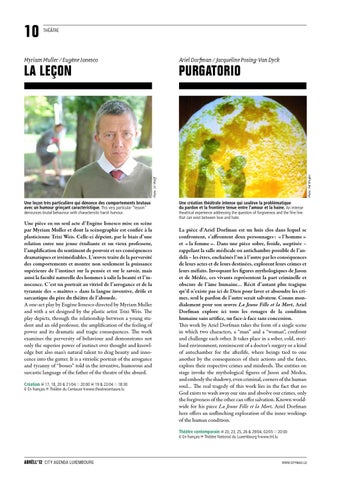ThÉâTRe
Myriam Muller / Eugène Ionesco
Ariel Dorfman / Jacqueline Posing-Van Dyck
purgAtorio
Photo : J.F. Wolff
lA leçon
Photo : Pat Wngler
10
une leçon très particulière qui dénonce des comportements brutaux avec un humour grinçant caractéristique. this very particular “lesson” denounces brutal behaviour with characteristic harsh humour.
Une pièce en un seul acte d’Eugène Ionesco mise en scène par Myriam Muller et dont la scénographie est confiée à la plasticienne Trixi Weis. Celle-ci dépeint, par le biais d’une relation entre une jeune étudiante et un vieux professeur, l’amplification du sentiment de pouvoir et ses conséquences dramatiques et irrémédiables. L’œuvre traite de la perversité des comportements et montre non seulement la puissance supérieure de l’instinct sur la pensée et sur le savoir, mais aussi la faculté naturelle des hommes à salir la beauté et l’innocence. C’est un portrait au vitriol de l’arrogance et de la tyrannie des « maîtres » dans la langue inventive, drôle et sarcastique du père du théâtre de l’absurde. A one-act play by Eugène Ionesco directed by Myriam Muller and with a set designed by the plastic artist Trixi Weis. The play depicts, through the relationship between a young student and an old professor, the amplification of the feeling of power and its dramatic and tragic consequences. The work examines the perversity of behaviour and demonstrates not only the superior power of instinct over thought and knowledge but also man’s natural talent to drag beauty and innocence into the gutter. It is a vitriolic portrait of the arrogance and tyranny of “bosses” told in the inventive, humorous and sarcastic language of the father of the theatre of the absurd. création E 17, 18, 20 & 21/04 H 20:00 E 19 & 22/04 H 18:30 S en français I théâtre du Centaure J www.theatrecentaure.lu
une création théâtrale intense qui soulève la problématique du pardon et la frontière ténue entre l’amour et la haine. an intense theatrical experience addressing the question of forgiveness and the fine line that can exist between love and hate.
La pièce d’Ariel Dorfman est un huis clos dans lequel se confrontent, s’affrontent deux personnages : « l’homme » et « la femme ». Dans une pièce sobre, froide, aseptisée – rappelant la salle médicale ou antichambre possible de l’audelà – les êtres, enchaînés l’un à l’autre par les conséquences de leurs actes et de leurs destinées, explorent leurs crimes et leurs méfaits. Invoquant les figures mythologiques de Jason et de Médée, ces vivants représentent la part criminelle et obscure de l’âme humaine… Récit d’autant plus tragique qu’il n’existe pas ici de Dieu pour laver et absoudre les crimes, seul le pardon de l’autre serait salvateur. Connu mondialement pour son œuvre La Jeune Fille et la Mort, Ariel Dorfman explore ici tous les rouages de la condition humaine sans artifice, un face-à-face sans concession. This work by Ariel Dorfman takes the form of a single scene in which two characters, a “man” and a “woman”, confront and challenge each other. It takes place in a sober, cold, sterilised environment, reminiscent of a doctor’s surgery or a kind of antechamber for the afterlife, where beings tied to one another by the consequences of their actions and the fates, explore their respective crimes and misdeeds. The entities on stage invoke the mythological figures of Jason and Medea, and embody the shadowy, even criminal, corners of the human soul… The real tragedy of this work lies in the fact that no God exists to wash away our sins and absolve our crimes, only the forgiveness of the other can offer salvation. Known worldwide for his piece La Jeune Fille et la Mort, Ariel Dorfman here offers an unflinching exploration of the inner workings of the human condition. théâtre contemporain E 20, 23, 25, 26 & 29/04, 02/05 H 20:00 S en français I théâtre national du luxembourg J www.tnl.lu
AbrËll'12 CITY agenda LUXeMBOURg
www.CITYMag.LU
